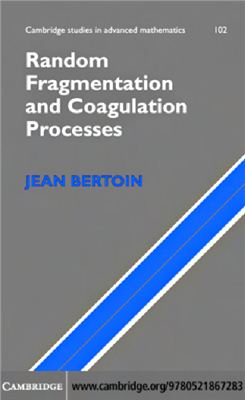Cambridge University Press, 2006, 280 pages. Cambridge Studies in
Advanced Mathematics 102.
Fragmentation and coagulation are two natural phenomena that can be observed in many sciences and at a great variety of scales - from, for example, DNA fragmentation to formation of planets by accretion. This book, by the author of the acclaimed L?vy Processes, is the first comprehensive theoretical account of mathematical models for situations where either phenomenon occurs randomly and repeatedly as time passes. This self-contained treatment develops the models in a way that makes recent developments in the field accessible. Each chapter ends with a comments section in which important aspects not discussed in the main part of the text (often because the discussion would have been too technical and/or lengthy) are addressed and precise references are given. Written for readers with a solid background in probability, its careful exposition allows graduate students, as well as working mathematicians, to approach the material with confidence.
Self-similar fragmentation chains
Random partitions
Exchangeable fragmentations
Exchangeable coalescents
Asymptotic regimes in stochastic coalescence
Fragmentation and coagulation are two natural phenomena that can be observed in many sciences and at a great variety of scales - from, for example, DNA fragmentation to formation of planets by accretion. This book, by the author of the acclaimed L?vy Processes, is the first comprehensive theoretical account of mathematical models for situations where either phenomenon occurs randomly and repeatedly as time passes. This self-contained treatment develops the models in a way that makes recent developments in the field accessible. Each chapter ends with a comments section in which important aspects not discussed in the main part of the text (often because the discussion would have been too technical and/or lengthy) are addressed and precise references are given. Written for readers with a solid background in probability, its careful exposition allows graduate students, as well as working mathematicians, to approach the material with confidence.
Self-similar fragmentation chains
Random partitions
Exchangeable fragmentations
Exchangeable coalescents
Asymptotic regimes in stochastic coalescence

